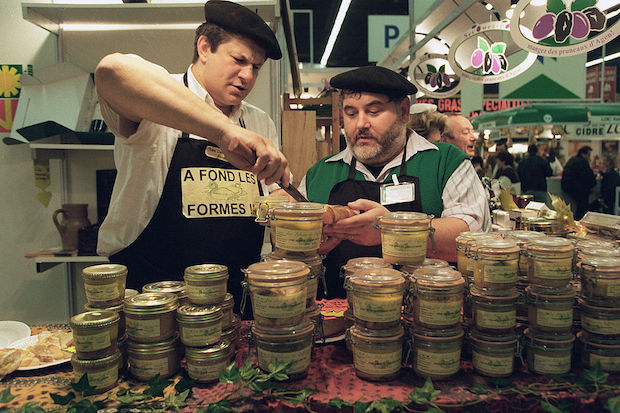We were surpassing Sydney Smith. His idea of heaven was pâté de foie gras to the sound of trumpets. Our version was an un pâtéd foie: even more delicious. Though no one had laid on Jeremiah Clarke, there was music: a bottle of Doisy Daëne ’75. In most of the Bordeaux area, 1975 was an austere year, and the fear was that the wines would live and die as sleeping beauties. Well, the Dozy Dean had awakened, to a harmony of structure and sweetness. There seems only one sensible response to such pleasures: ‘God’s in his heaven and all’s right with the world.’
Instead, however, the conversation took a melancholy tone. We started with that unendingly paradoxical figure, W.B. Yeats. In the Hammersmith of the 1890s, old women of both senses often met to talk nonsense. Phrenology, ouija boards, séances: these suburban Owen Glendowers tried to call spirits from the vasty deep, and were lucky that no one called for the men in white coats. But no such gathering, however absurd, was complete until Yeats had joined it. Nor was he ever fully cured, as some of his later mystical effusions testify. Much of it is reminiscent of that most undozy — and tragic — of deans, Jonathan Swift, as he descended into lunacy. ‘Why do they call him Aristophanes? Because he had such airy stoff an he’s head.’ So, often, did Yeats.
Yet he was also one of the major political intelligences of all time. ‘Easter, 1916’: has there ever been a more profound political poem? Then there is the definitive four word history of Ireland, and of Israel/Palestine: ‘Great hatred, little room.’ Or what about that call to arms which should inspire anyone of a Conservative disposition: ‘The fascination of what’s difficult’. But it is followed by an instant and salutary corrective: ‘…has dried the sap out of my veins and rent/ Spontaneous joy and natural content/ Out of my heart.’ To think of that in the presence of foie gras and Barsac? An even greater student of the human condition than Yeats has the explanation: ‘Lord, what fools these mortals be.’
We compounded our folly by moving on to the indispensable cliché. No phrase ever becomes a cliché unless it was originally redolent of salt, pith and wisdom. Then it grows mouldy and has to be set aside, at least for a generation. In the 1890s, ‘he has the defects of his qualities’ was so grossly overused that it would surely have provoked a groan — to such an extent that it was forgotten. Now, it is restored to pristine wit, at least for a season. But one cliché cannot be discarded. ‘Things fall apart, the centre cannot hold… the best lack all conviction, the worst are full of passionate intensity.’ Thus is summarised the course of world events since 1914. Thus did Yeats toll the funeral bell of the Enlightenment.
On reflection, that might explain the absurdities of Hammersmith, and the mysticism. Nietzsche had warned that if you stared into the abyss for too long, it will stare back at you. He did; it did. Perhaps Yeats was trying to avoid a similar fate and knew that no rescue was to be found in reason.
On a dark winter night, small children will often tell each other ghost stories, so successfully that they are terrified to be left in their bedrooms, more than ever convinced that there are bears under the bed. We were rescued from the adult equivalent by some Viña Tondonia Gran Reserva ’04, which I highly commend, not that there is ever a disappointment from that noble producer. This is a gaudeamus igitur of a wine. Eat, drink and be merry — and ignore the next line.
The post Eat, drink and be worried appeared first on The Spectator.
Got something to add? Join the discussion and comment below.
Get 10 issues for just $10
Subscribe to The Spectator Australia today for the next 10 magazine issues, plus full online access, for just $10.
You might disagree with half of it, but you’ll enjoy reading all of it. Try your first month for free, then just $2 a week for the remainder of your first year.















Comments
Don't miss out
Join the conversation with other Spectator Australia readers. Subscribe to leave a comment.
SUBSCRIBEAlready a subscriber? Log in